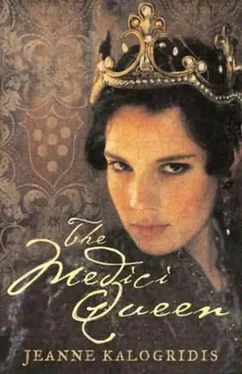Guise’s attack on the Hôtel de Béthizy was a resounding success. Two of his common soldiers kicked down the door to the bedroom where Coligny lay with Doctor Paré at his bedside. When asked to identify himself, Coligny did so freely but looked on the soldiers with disdain, saying, “I should be killed by a gentleman, at least, and not these boors.” In answer, one of the boors ran his sword through the Admiral’s chest and flung him out the window. The body chanced to land right beside the delighted Duke of Guise.
By then, vengeful Catholics had taken to the streets; they castrated the body, dragged it through the city, and hurled the mutilated corpse into the Seine. Guise proudly delivered the head to me, in a silk pouch that failed to contain its overpowering stench. I turned away in horror and ordered it embalmed.
I managed to keep Henri of Navarre and his cousin the Prince of Condé out of Anjou’s clutches. On the day Coligny died, I went secretly to Margot and told her of her brother’s deception; together, we went to Charles and presented the evidence of Navarre’s innocence. His Majesty was then easily convinced that Navarre and Condé-being Princes of the Blood-must be spared and issued a royal order. Afterward, once the fighting had eased, I went to the Provost of Marchands, who verified that no Huguenot army had ever arrived and that he had not been the one who personally intercepted the letter to Navarre’s field commander. Edouard had produced it; the Provost, like Marshal Tavannes and other military leaders, had relied on the Duke of Anjou’s word.
Edouard never came up with the incriminating letter supposedly written by Navarre, nor did we ever again confide in each other. I warned Navarre of Anjou’s guile; he was grateful, though ravaged by grief at the loss of his companions and coreligionists, and resentful of the fact that, for his own protection, he was required to reconvert to Catholicism and remain at the Louvre under courteous house arrest.
The massacre born on Saint Bartholomew’s Day broke Charles. He began-no doubt to Edouard’s glee-to spiral down toward death.
September came, bringing with it relief from the heat and the violence. When the palace gates were again opened-a week and a day after Admiral Coligny’s assassination-I received my first visitor behind the closed doors of my cabinet.
Cosimo Ruggieri was no longer ageless: The lamplight showed too clearly the silver in his hair and beard, the deep, wrinkled folds under his black eyes, the slackness of age beneath his jaw. He was gaunt, even skeletal, the ugliness of his irregular features enough to send the bravest child running to its mother. He had given up his customary red and now dressed all in black, like a Huguenot.
He entered to find me sitting at my desk as always, as if little time had elapsed since our last encounter, and as he always had, he bowed low. But when he raised his face to mine and the time came for him to utter a greeting, the words died upon his lips. Stricken, he stared at me.
“Cosimo,” I said, rising. I came around my desk-perhaps to take his hand, perhaps to embrace him, I cannot say. But before I could reach him, my legs and my nerve at last gave way, and I sank to my knees, senseless with grief.
He knelt beside me. I clung to him, broken, weeping.
When I could speak, I gasped, “They have come again-the evil dreams. The dead are not even all buried, and yet the dreams have come. I will do what I must: I will kill my sons, by my own hand if I must, to make it stop. You warned me, and I would not hear. But I am listening now.”
His expression was open and raw, free from the magician’s dark glamour; the play of lamplight on his unshed tears dazzled me. “There is no more need of blood,” he murmured. “Only set the demon free, and let the stars take their course.”
I shook my head, not understanding.
He echoed my husband’s words to me: Destroy what is closest to your heart .
It was a simple matter, accomplished in Ruggieri’s temporary lodgings nearby: the casting of a circle, the placing of the bloodied pearl upon the altar, the invocation of the barbarous name. When the demon appeared-its presence announced by the sudden leaping of the flames and the prickling of gooseflesh on my arms-the magician thanked it and released it from its task. With all supernatural support withdrawn, my sons would meet their ends quickly.
Ruggieri would have disposed of the disempowered pearl himself, but I put my hand on it first. “This falls to me,” I said.
My carriage rolled through quiet streets up to the banks of the river Seine, and the nervous driver waited while Ruggieri and I picked our way through scattered refuse down to the muddy shore.
The sky was cloudless that day, the air fresh; the previous day’s storm had washed away the dust and the smell of decay that had permeated the city. For a moment, I stood looking south at the twin towers of Notre-Dame and the dainty spires of Sainte-Chapelle-sights that had filled my husband’s namesake Henri of Navarre with such longing. And then I lifted my arm and hurled the pearl into the dark waters; it skipped twice and sank beneath the surface without a sound.
I, too, sank silently. Had it not been for Ruggieri’s restraining arms, I would have fallen.
“I kept my promise,” I whispered. The magician did not reply; he knew I did not speak to him.
“I kept my promise, my love,” I repeated, my voice stronger. “A son of Valois will always sit upon the throne. Your one true heir will rule.”
My blind selfishness, my unwillingness to step aside and release my husband to find his rightful wife had birthed incomprehensible misery. Beneath its weight I could neither stand nor walk, but Ruggieri nonetheless returned me to the carriage before I dissolved completely, like the spell.
I dreamt again that night.
I dreamt of Charles’s imminent death, of the coughing and the fever, of the blood-soaked sheets that were changed almost every hour. Knowing that my own actions had hastened his final agony, I lay sobbing beside him in the bed, my arms around him as he whispered his final words: Ma mere… Eh, ma mere …
I dreamt, too, of Edouard, of the madness, deceit, and cruelty he no longer hid once he ascended the throne and stripped me of all power. I saw the brutality, the executions, the murders, the hatred he provoked until the people turned on him and he met his untimely end disemboweled, fittingly, by an assassin’s blade.
I dreamt of Henri, King of France and Navarre, who-for the sake of peace-became a Catholic so that he could be crowned properly in a cathedral, saying, Paris is well worth a Mass . I saw Huguenots and Catholics reconciled and a country united, ruled at last by a canny monarch who put the welfare of its citizens before his own, a ruler so beloved by his subjects that they dubbed him Henri the Great. I saw a France at peace and prosperous.
I did not dream of blood. I woke grief-stricken yet relieved, with prayers of contrition on my lips.
I reported this all to Ruggieri the next afternoon, after he had arrived with his paltry belongings to settle into his new apartments at the Louvre. Clad in a plain black doublet and matching ruff, he seemed incongruous with the gilded walls, the delicate, feminine furniture, and the pale blue brocade curtains, pulled back to admit the waning light. Like me, he had slept little since the massacre on Saint Bartholomew’s Day; at the sight of his exhaustion, I insisted he sit beside me in the antechamber while his valets thumped about in the bedroom, unpacking his things.
“I have done my best to make amends,” I said softly. “But I cannot bring back all the innocents who have perished. And I cannot bear to watch my beloved sons-monsters though they may be-die. I have had more than enough sorrow for one life. Let me die, too, Cosimo.”
Читать дальше
Конец ознакомительного отрывка
Купить книгу












